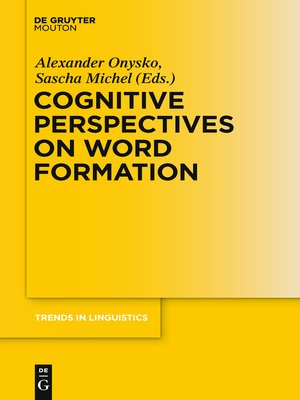Cognitive Perspectives on Word Formation
ebook ∣ Trends in Linguistics. Studies and Monographs [TiLSM]
By Alexander Onysko

Sign up to save your library
With an OverDrive account, you can save your favorite libraries for at-a-glance information about availability. Find out more about OverDrive accounts.
Find this title in Libby, the library reading app by OverDrive.



Search for a digital library with this title
Title found at these libraries:
| Library Name | Distance |
|---|---|
| Loading... |
While cognitive linguistics has become established as a comprehensive research paradigm over the last three decades, it has so far hardly contributed to investigations into processes of lexical creation as traditionally captured in research on word formation. In light of this, the volume at hand is the first one to take a step ahead towards illuminating diverse aspects of word formation from cognitive perspectives. The book combines contributions to the 2nd International Cognitive Linguistics Conference of the German Cognitive Linguistics Association with a selection of invited papers by scholars working on issues of word formation and cognitive linguistics.
This selection is guided by pluralism in both methodology and topics. Thus, some contributions are of a primarily theoretical nature discussing, for example, recombinance as a model of word formation and a taxonomy of word formation processes as construction types. Several articles address interface issues such as word formation and phrasal constructions, word formation and inflection, as well as phonology and word formational patterns. The majority of the studies focuses on individual types of word formation (compounding, affixation, and conversion), and they contribute to reframing our understanding of these processes. With a focus on mostly Germanic languages (Afrikaans, Dutch, English, German, Luxembourgish, and Norwegian), data-driven analyses include corpus linguistic investigations, elicited data, psycholinguistic experiments, and computational linguistic applications. A few contributions follow a mainly introspective path of reasoning based on the discussion of selected examples as in the analysis of creative compounds.
Overall, the volume provides a rich array of topics emerging under the umbrella of cognitive linguistic thought and established patterns and processes of word formation. The various studies add to a yet marginal body of research in cognitive word formation and, thus, advance our awareness about the benefits of applying cognitive linguistic thoughts for investigating processes of lexical creation.







